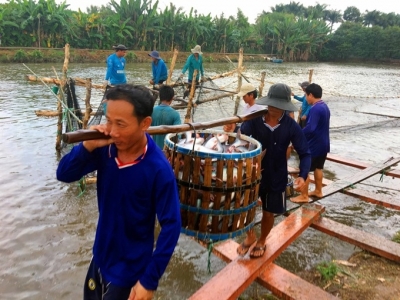US to inspect Việt Nam catfish controls

In January 2018, catfish exports to mainland China, Hong Kong and ASEAN increased sharply, while exports to the EU market continued to decline. People harvest catfish in Bình Thủy District, Cần Thơ City. — VNA/VNS Photo Thanh Liêm
HÀ NỘI – The US Department of Agriculture’s Food Safety and Inspection Service (FSIS) will inspect Việt Nam’s catfish quality control system in the next few months, according the National Agro-Forestry-Fisheries Quality Assurance Department (NAFIQAD).
In early March, NAFIQAD received a letter dated February 28, 2018 from FSIS announcing that FSIS has completed its review of Việt Nam’s self-reporting tools (SRT). FSIS determined that the country’s documented inspection system of controls appears to provide an equivalent level of public health protection as that applied domestically in the US.
FSIS also announced that it would conduct its own inspections of Việt Nam’s reports in the next few months. The specific day that the inspection will be implemented would be announced by FSIS later, the NAFIQAD said.
According to the US inspection programme for siluriformes, including catfish, Việt Nam’s catfish products exported to the US will be strictly controlled from the stages of raising and harvesting fish to processing and packaging them.
In the past, NAFIQAD has co-operated with relevant agencies under the Ministry of Agriculture and Rural Development, Việt Nam Association of Seafood Exporters and Producers (VASEP) and enterprises processing catfish for exports to the US to provide over 2,000 pages answering questionnaires under the SRT policies of the US catfish inspection programme.
In preparation for receiving the FSIS delegation of inspecting siluriformes production in Việt Nam, NAFIQAD has required enterprises processing siluriformes for export to the US to continue implementing US regulations.
The enterprises must make timely reports to the ministry and relevant agencies of their difficulties when exporting siluriformes to the US in order to quickly develop solutions, said NAFIQAD director Nguyễn Như Tiệp.
Meanwhile, the enterprises must coordinate with NAFIQAD to develop a specific working plan with the FSIS’ inspection delegation.
Tiệp said to maintain their exports to the US, the enterprises must continue to upgrade their quality assurance system to ensure that products do not contain microorganisms or antibiotic residues.
The strict control would avoid the situation in which products arrive in the US but fail to pass inspection and are returned, damaging the business of the enterprises as well as the prestige of Vietnamese catfish products, he said.
VASEP secretary general Trương Đình Hòe said that Việt Nam has done its best to deal with issues related to equivalence and the US has given specific instructions on how to comply with its requirements.
According to VASEP, Việt Nam’s catfish industry has developed well with a strict food safety control system.
However, VASEP is concerned that the US Government’s policy on imports to the US could create new challenges for Việt Nam’s pangasius exports to that market, Hòe said.
Catfish exports
According to VASEP, the total export value of Việt Nam’s catfish in January reached US$172.5 million, a year-on-year increase of 43.7 per cent.
In January 2018, catfish exports to mainland China, Hong Kong and ASEAN increased sharply, while exports to the EU market continued to decline.
However, many exporters of catfish are expected to face many difficulties, including lack of raw materials and purchasing prices of material to peak at above VNĐ30,000 per kilo. The higher price of raw materials would push the export value of pangasius up further in the future.
The export value of catfish to mainland China and Hong Kong increased 132 per cent over the same period in 2017 to $41 million, becoming the largest export market for Vietnamese catfish products.
The export value of Vietnamese catfish to the US market reached $26 million, up 31 per cent while the export value to ASEAN market also reached $19.1 million, up 126 per cent over the same period last year.
With the high export value, ASEAN surpassed the EU to become Việt Nam’s third largest export market. This year, ASEAN is expected to retain this important position.
Three other potential markets are Mexico, Colombia and Saudi Arabia, with high growth rates of 55.7 per cent; 81.4 per cent and 78.9 per cent, respectively
Related news
 Seafood, apparel stocks seen benefiting from CPTPP
Seafood, apparel stocks seen benefiting from CPTPP Enterprises in the aquaculture, garment and textile sectors are expected to benefit from the newly signed CPTPP while agricultural and financial firms will face
 Fish catches, aquaculture harvests rise
Fish catches, aquaculture harvests rise The total fish catch in the country reached 496,900 tonnes in the first two months of the year, up 1.2 per cent year-on-year
 Tiền Giang develops freshwater aquaculture
Tiền Giang develops freshwater aquaculture Freshwater aquaculture has prospered in the Cửu Long (Mekong) Delta province of Tiền Giang recently because of advanced farming methods and good prices